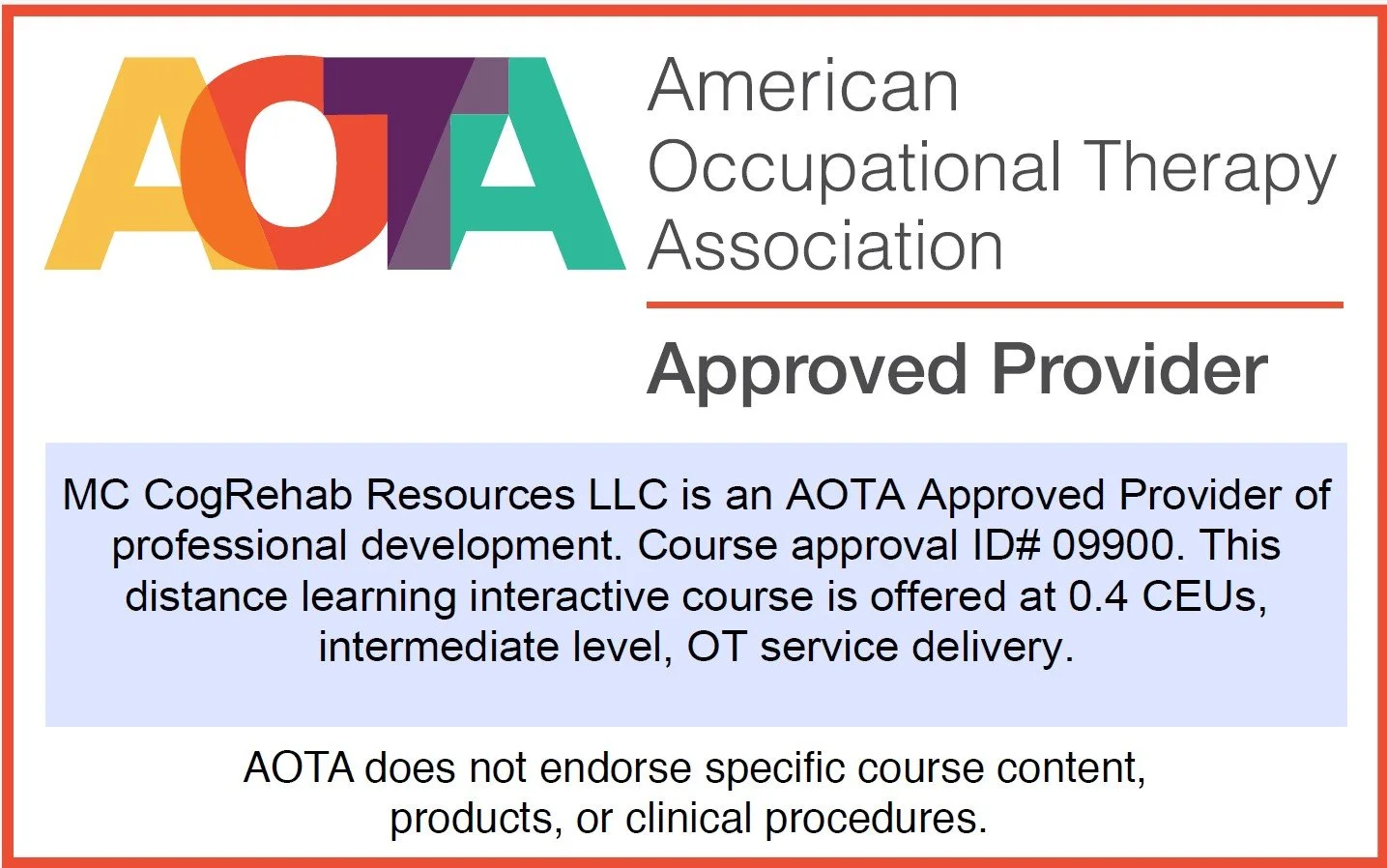Description: This course designed by Joan Toglia PhD, OTR/L and Chelsea Elkind MS, OTR/L will provide participants with a working knowledge of the Intensive Care Unit (ICU) and critical illness acquired delirium, Postoperative Cognitive Disorder (POCD) and Post Intensive Care Syndrome (PICS). Assessment and intervention strategies to promote optimal functional cognitive recovery and outcomes in the adult ICU and acute care setting will be reviewed. Evidence suggests that a combination of nonpharmacological methods including early cognitive intervention and engagement in meaningful activities can prevent or significantly reduce delirium incidence and duration in acute care as well as the adverse long-term cognitive effects. Strategies to engage family and patients in activities at different points in recovery, in the acute care setting, that capitalize on emerging cognitive abilities will be highlighted. This course will review tools for assessing, monitoring or optimizing key cognitive abilities and function in critically ill and acute care patients. A framework for integrating functional cognitive activities into the ICU and acute care environment will be discussed within the context of a team approach. Case examples will be presented, and participants will be asked to apply knowledge and methods to case scenarios. Active participation is required. Worksheets, polling questions, and interactive discussions using the chat feature, will be utilized to assess learning objectives stated below.
Audience: This course is designed for OT, PT or SLP with at least 1 year of experience working with adolescent or adult populations.
Content Level: Intermediate.
Instructor: Chelsea Elkind, MS, OTR/L
CEUs: The course is a total of 4 contact hours. (2 hours each session)
Each course is split into 2 days. Both days are required. Times are Eastern Time (ET) or time in New York. For those in a different time zone, it may be helpful to use Time Converter or www.thetimezoneconverter.com. Zoom live translated captions for approximately 35 languages are available for this course.
This course will be offered again in Fall, 2026
Course Fee: $115.00 USD
Course Outline
Session 1: Delirium overview, Assessment tools in the ICU and acute care, Multicomponent intervention and prevention strategies
Overview of Post-Intensive care syndrome, Post-operative Cognitive Disorder, Delirium and subtypes: it’s impact and implications for Prevention and Assessment (20 min)
ICU, delirium, and Acute Care rating scales, micro screenings, and basic functional cognitive assessment methods (30 min)
Application to case scenarios (25 min)
Delirium Prevention Programs to promote decreased incidence and length of Delirium (45 min)
- Multicomponent team-based Delirium Prevention Programs: Current and emerging evidence
- Strategies to promote and support family engagement, communication, activity engagement, and interdisciplinary collaboration
Session 2: Intervention Addressing Functional Cognition in the ICU and Step-Down Units
Quick overview of cognitive symptoms, terminology, and activity examples (15 minutes)
Treatment approaches and a framework for functional cognitive Intervention activities in acute care (15 minutes)
Case application and group discussion (35 minutes)
Thinking out of the Box: ICU functional cognitive activities (30 minutes)
Matching and combining cognitive and motor skills and interprofessional strategies (15 min)
Summary and discussion (10 minutes)
Learning Objectives: Participants will be able to
Apply knowledge of cognitive screening and/or functional assessment tools suitable for the ICU or acute care environment for 2 case scenarios
Select and apply the use of at least three delirium prevention strategies that include families and the interdisciplinary team
Apply knowledge to a case scenario for selecting ICU functional cognitive, occupation-based activities at the appropriate level of challenge, to promote early cognitive abilities and activity engagement.
Design functional cognitive treatment that simultaneously addresses both physical and cognitive goals within an acute care environment
Apply knowledge of functional cognitive treatment intervention strategies approaches to a case scenario.
Sample Comments From Course Participants
The course was wonderful!! So many resources were provided for both tools to use in practice and literature supporting the efficacy of the interventions being suggested; this will allow me to provide upper management at my hospital with tangible information on how these strategies can prevent delirium and elongated length of stay
I appreciated learning about the different assessments that are available to use for cognition and breaking them down based on levels of cognition (e.g level 1, lev 2), having different cognitive intervention ideas to pull from-i work in a hospital where resources are limited so this was beyond helpful. Being able to have a toolbox of sorts of different activities that can be utilized with patients was great.
Chelsea was a great presenter and I appreciate the knowledge she was able to provide and share with us. I would definitely take another course taught by her if the opportunity presents itself!
The short and fast cognitive screens that one could use, and alternatives to the more common ones was very useful. Also, Exposure to the different delirium screens and what can be done for screens when they're actively delirious. Ideas for all the treatment ideas in an acute care setting was very good.

